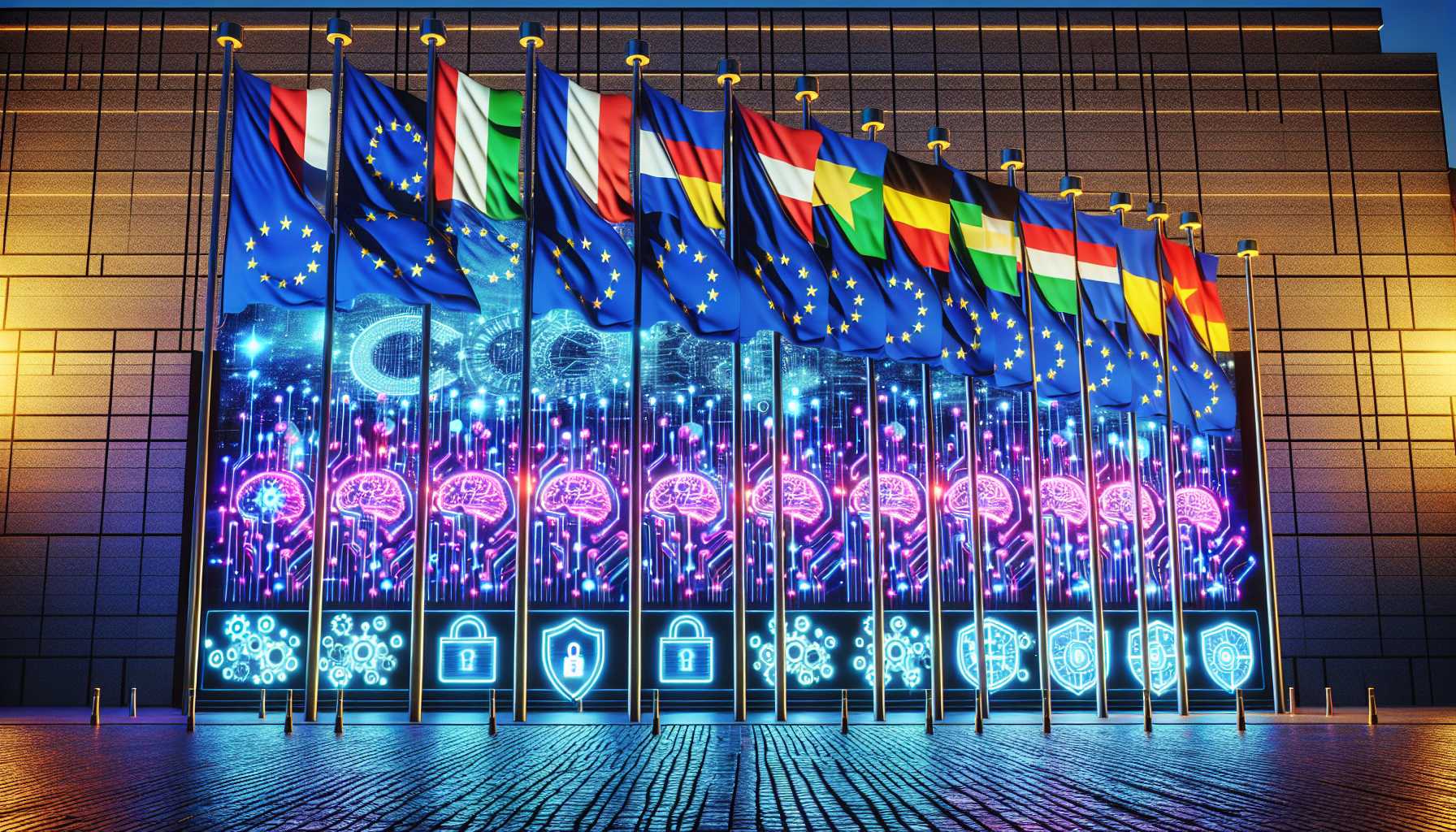The Pioneering European AI Act: A Beacon for Global AI Governance
In a bold stride toward securing the ethical utilization of artificial intelligence, the European Union has unfurled a groundbreaking regulation known as the AI Act. With its recent approval, this Act ushers in an era where the fearsome power of AI is finally harnessed with a responsible hand. No longer shall the AI landscape be a technological Wild West. Instead, the EU’s latest move aims to establish a balanced ecosystem where innovation flourishes yet fundamental freedoms and democratic values remain unassailable.
The EU’s trailblazing legislation is much more than legal jargon; it’s a clarion call for a global reassessment of AI’s role in society. Targeting notorious offenders like unregulated biometric categorization systems, emotion recognition without consent, and the divisive potential of social scoring, the AI Act takes a firm stand against practices that could endanger personal autonomy or undermine human dignity.
Bearing in mind the delicate balance between security and privacy, there’s an olive branch extended to law enforcement agencies—controlled, authorized use of real-time biometric identification is permitted but only in the crucible of dire circumstances, such as tracking down missing persons or thwarting terrorist threats.
This legislation isn’t just about putting a leash on the wild hounds of AI. It lays the cornerstone for nurturing a landscape where General Purpose AI (GPAI) systems are transparent, accountable, and, above all, respectful of the European Charter of Fundamental Rights. In the same breath, it demands that deepfakes and other AI-manipulated media bear the label of their artificiality, cutting through the potential chaos of misinformation and protecting the sanctity of truth.
Roberta Metsola’s words resonate as a testament to unprecedented progress: the AI Act is a paragon of leadership that promises to steer the innovation engine while saluting the emblem of human rights. Thierry Breton’s distillation of the AI Act’s soul is poignant: “regulating as little as possible – but as much as needed!”
Navigating the Soundscapes: Neil Young’s Reemergence on Spotify and Beyond
From the melodious folds of music streaming springs an interesting development—Neil Young, the erstwhile digital dissident of Spotify, retakes his place on the platform that once felt his scorn. His return is a statement, a reflection of both the changing dynamics within music streaming services and an indictment of the sound quality that haunts the halls of Spotify.
Yet, why weave this yarn in a tapestry of tech news? Apart from the ironies of Young’s return hinging on the non-exclusivity of Joe Rogan’s podcast, his venture back into the Spotify fold casts a lens on the imprints of technology giants in the shape of AI and algorithms that both amplify and disseminate sound, opinion, and perhaps even misinformation.
It’s the potent reminder that in our pursuit of sonic perfection or platforms that echo our thoughts, we willingly, and sometimes unwittingly, surrender to ecosystems that pull the strings of our perception and preferences. Young’s homecoming narrative is a complex tapestry—a patchwork of personal principles, market forces, and the undulating quality of digital audio. It’s a trek through the technological soundscape where our ears become arbiters of our allegiance and our choices ripple through the industry.
AI at the Polls: Google’s Gemini and the Safeguarding of Democracy
As we inch closer to the pivotal moments of casting votes and shaping futures, Google’s Gemini comes under the spotlight, its AI tongue restrained just enough to safeguard against the tempest of electoral misinformation. In an era punctuated by the throes of fake news and polarizing content, Google’s preemptive action is a clarion call for AI’s role in supporting an informed electorate.
The spotlight on Google’s measures ahead of the U.S. presidential race reveals a tech titan grappling with the colossal responsibility of shepherding information. This isn’t just about sidestepping controversy; it’s a deliberate, calculated stride towards stemming the tide of divisive and falsified content that threatens to engulf the democratic process.
Gemini’s restraint is a snapshot of a larger narrative: how do we mold AI to serve as sentinels of truth rather than agents of chaos? Google’s tightrope walk embodies the tech sector’s awakening to its power to influence society’s fabric for better or worse.
Changing Tides in App Distribution: Apple’s Shift Towards Web-Based Accessibility
In an environment increasingly defined by independence from centralized marketplaces, Apple unveils its newfound adaptability with permitting iOS apps to leap over the walls of its famed App Store. They call it Web Distribution—developers, once handcuffed by the exclusivity of app ecosystems, can now breathe the free air of the web, distributing their creations with newfound autonomy, albeit still within the reach of Apple’s increased flexibility.
This pivot heralds a recognition, perhaps grudgingly, of the vibrancy and necessity of diverse dissemination channels in a world where developers’ creations need not be tethered to monolithic repositories of software. Apple’s concession to the European Union’s digital market regulations is a smaller thread in the grand weave of tech’s evolution. It’s no revolution, but a noteworthy evolution that speaks to the very heart of how software intersects with sovereignty and choice.
From Snapshots to Landmarks: AI-powered Visual Search Gets Real
Imagine strolling through a foreign city, each building whispering its history into your ear. This is no longer the stuff of science fiction, thanks to the AI-powered visual search features embedded in Ray-Ban’s Meta sunglasses. This fresh feature puts technology at the traveler’s service, transforming holiday snapshots into educational excursions.
This isn’t just a tech gimmick; it’s an extension of our curiosity, melded seamlessly with the AI’s capabilities to enrich our understanding of the world around us. It’s technology that makes us not just passengers of our environment, but engaged explorers of a landscape imbued with stories waiting to be told.
Such AI-enabled functionalities are a testament to technology’s potential to merge the informative with the experiential, reshaping our perception of what devices can do for us—not just serve our needs but elevate our experiences.
Wrapping up: Reflecting on the Tech Industry’s Evolution and Responsibility
As we pirouette through these narratives—from Europe’s AI Act poised to safeguard our digital dignity, Neil Young’s principled Spotify saga, Google’s Gemini chatbot on the frontlines of democracy, to Apple’s concession to web-based app distribution and Meta’s AI-assisted travel—each thread weaves into the grand tapestry of an evolving tech ecosystem. An ecosystem that must balance the relentless pursuit of innovation with the gravitas of societal responsibilities.
It’s a titanic tale of convergence, where ethics, autonomy, and the user experience merge on a canvas painted with the bytes and bits of our increasingly digital existence. As the tech landscape continues to unfurl at breakneck speed, these vignettes remind us of our role as custodians of the future we shape with every tap, swipe, and click. Let us then tread with both wonder and wisdom, for in the marriage of technology and ethics, we craft the world of tomorrow—a world that we will be proud to bequeath to the generations that follow in our digital footsteps.





